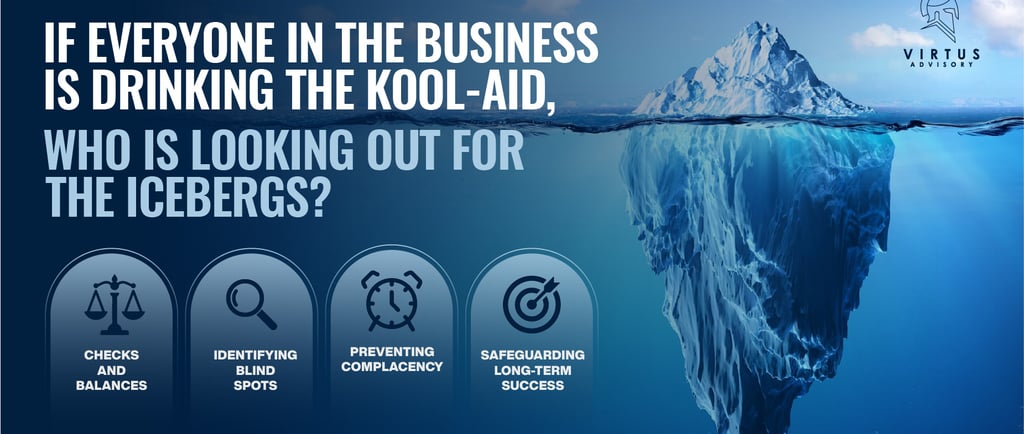If everyone in the business is drinking the kool-aid, who is looking out for the icebergs?
The importance of professional skepticism
RISK MANAGEMENT


A unified, motivated team is a powerful force—but there’s a fine line between unity and groupthink. When everyone is "drinking the Kool-Aid"—fully bought into the vision, mission, and leadership—there’s a risk of missing critical threats. That’s where professional skepticism can help.
No matter how aligned or enthusiastic the team is, every business needs people willing to ask tough questions, challenge assumptions, and keep leadership accountable. This isn't about being negative—it's about being realistic and ensuring that potential icebergs don’t go unnoticed while everyone is caught up in the excitement of smooth sailing. Here’s why fostering professional skepticism is crucial for every business:
Checks and Balances
Leadership must be held accountable for decisions. While it’s great to have a unified culture, having individuals or teams, with the right systems and processes, who are willing to question decisions or strategies ensures that oversight and critical thinking remain part of the process.
Identifying Blind Spots
Every business has blind spots—areas where assumptions are made or risks overlooked. Encouraging professional skepticism allows teams to uncover potential pitfalls, like market changes, operational weaknesses, or emerging competitors, that might not be visible through a purely optimistic lens.
Preventing Complacency
When everyone believes the business is on the right track, it’s easy to become complacent. Professional skepticism helps maintain a healthy level of vigilance, ensuring that teams continuously look for ways to improve, evolve, and detect risks.
Safeguarding Long-Term Success
Constructive criticism and accountability are essential for long-term sustainability. Encouraging a level of skepticism ensures that decisions are based on sound reasoning and evidence, not just enthusiasm.
Encouraging professional skepticism doesn't mean creating a culture of distrust; it means building a workplace where people feel comfortable speaking up and offering different perspectives. Creating systems that build a strong risk culture with fit-for-purpose safeguards can ensure businesses keep one eye on the goal and the other on threats to achieving key objectives.
Ultimately, it's not the optimists or the skeptics who guarantee success—it's the balance between the two that keeps a business on course and steers it away from potential icebergs.
Talk with us today to learn about how Virtus Advisory can help you get started.
Our communication lines are open.
📞 +0429551088
